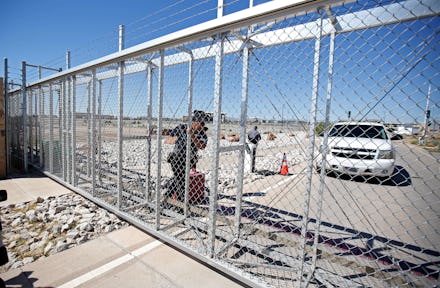Lawyers demand release of 20 transgender women asylum seekers in ICE custody

A group of lawyers has filed petitions demanding the release of 20 transgender women asylum seekers, all of whom are currently being held by Immigration and Customs Enforcement despite credible evidence that their gender identity puts them at serious risk of persecution in their home countries.
The petitions, filed this week by eighteen volunteer lawyers with two outstanding, focus on the cases of 20 women being held in the Cibola County Correctional Center in New Mexico. According to a press release from the ACLU of Massachusetts, the women arrived in California from their home countries — El Salvador, Honduras and Guatemala — back in May.
Bill Newman, director of the ACLU of Massachusetts’ western Massachusetts office, told the Daily Hampshire Gazette that all 20 women had an interview with asylum officers where it was determined that they each had a credible fear of persecution in their home country “on account of being transgender, an identifiable social group.”
But in spite of a federal law that leaves it up to ICE to determine whether or not an immigrant claiming asylum should remain in custody for the duration of their case, a new policy instituted by the Department of Homeland Security and ICE in five field offices in the U.S. under the Trump administration — including the one in New Mexico handling the women’s cases — makes it mandatory to detain all asylum seekers, even when they meet the conditions for release, on the basis that it will deter others from pursuing the protection.
“If the petitions are considered on their merits, they would result, we believe, in release on parole because all are meritorious, and they all meet the legal criteria for release,” Megan Kludt, a Northampton-based immigration attorney, told the Gazette. “On the other hand, if ICE applies its blanket policy of denial regardless of the merits and humanity of the petition, then they will be denied.”
Although the women are all being held in New Mexico, the lawyers were organized through the ACLU of Massachusetts’ Immigration Protection Project and filed via the Santa Fe Dreamers Project — a service that provides legal aid to the New Mexico immigrant community — because the overwhelming need for legal assistance at the border was far greater than it was locally.
Harris Freeman, an attorney who worked on the project and one of the founders of the Immigration Protection Project, reiterated that the women are detainees who, “for the most part, came to the border at a port of entry and stated their request for asylum, which they are entitled to do under U.S. law and international law.”
“They were detained, pending the immigration court hearing on this, but there is a mechanism clearly laid out in federal law and regulations that gives ICE the ability to parole these women so that they don’t have to suffer while they pursue an immigration claim that is recognized under international law,” Freeman told Mic on Monday.
Freeman added that the coordination of legal resources between one part of the country where attorneys are readily available, and another where they are so sorely needed, speaks to the urgency of the type of work being done.
“The lawyers who are doing this work, we’re really riding the coattails of the people driving the bus, which is the people all across the country who are taking action against what they see as a broken and immoral immigration system,” he said.
According to the press release, each lawyer has submitted a packet detailing each woman’s individual case for release, including materials on sponsors who have agree to take in the women as their cases are adjudicated.
“These transgender women have been aided by the fact that supporters of their right to asylum have stepped forward and said, ‘I will sponsor this person,’” Freeman said. “That laid the basis for our being able to file petitions, to indicate, among other things, that there were people willing to provide housing, food, all these other things while they await a verdict on asylum within the immigration court.”
ICE officials are expected to reach a decision on the parole requests by the end of the month.